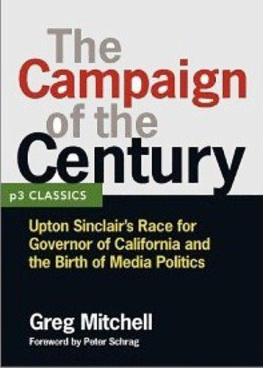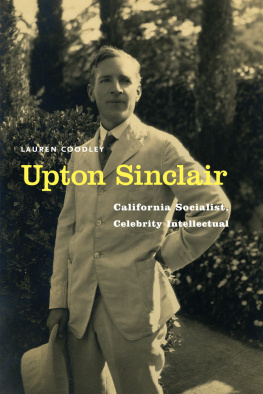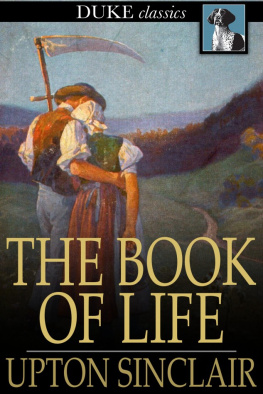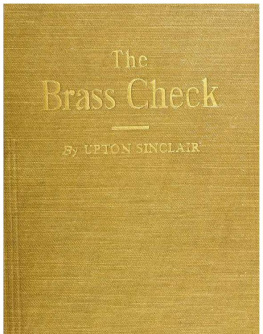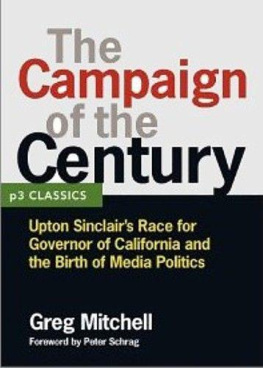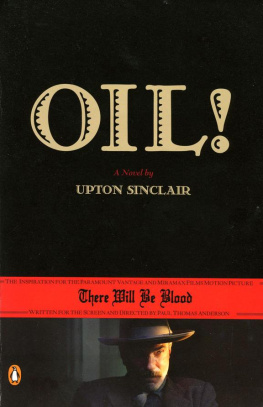Sinclair Upton - The Campaign of the Century: Upton Sinclairs Race for Governor of California and the Birth of Media Politics
Here you can read online Sinclair Upton - The Campaign of the Century: Upton Sinclairs Race for Governor of California and the Birth of Media Politics full text of the book (entire story) in english for free. Download pdf and epub, get meaning, cover and reviews about this ebook. City: New York, California, Kalifornien, California, year: 1992, publisher: Random House, genre: Detective and thriller. Description of the work, (preface) as well as reviews are available. Best literature library LitArk.com created for fans of good reading and offers a wide selection of genres:
Romance novel
Science fiction
Adventure
Detective
Science
History
Home and family
Prose
Art
Politics
Computer
Non-fiction
Religion
Business
Children
Humor
Choose a favorite category and find really read worthwhile books. Enjoy immersion in the world of imagination, feel the emotions of the characters or learn something new for yourself, make an fascinating discovery.
- Book:The Campaign of the Century: Upton Sinclairs Race for Governor of California and the Birth of Media Politics
- Author:
- Publisher:Random House
- Genre:
- Year:1992
- City:New York, California, Kalifornien, California
- Rating:4 / 5
- Favourites:Add to favourites
- Your mark:
The Campaign of the Century: Upton Sinclairs Race for Governor of California and the Birth of Media Politics: summary, description and annotation
We offer to read an annotation, description, summary or preface (depends on what the author of the book "The Campaign of the Century: Upton Sinclairs Race for Governor of California and the Birth of Media Politics" wrote himself). If you haven't found the necessary information about the book — write in the comments, we will try to find it.
A colorful account of Californias 1934 gubernatorial race, a forerunner of todays high-decibel, high-tech electioneering. Upton Sinclair, author of the meat-packing expos The Jungle and a prominent Socialist who became a Democrat only a year before the general election, electrified millions with his EPIC (End Poverty in California) movement--and at the same time alarmed, in Mitchells words, ``an array of powerful enemies almost unparalleled in American politics, including William Randolph Hearst, Herbert Hoover, and film-mogul L.B. Mayer. Mitchell (Truth...and Consequences, 1981) follows the nine-week campaign almost day by day, from the morning after Sinclairs astonishing primary victory to his November defeat at the hands of the lackluster, reactionary GOP incumbent, Frank Merriam. In between, California became a laboratory for the modern negative mass-media campaign, as Sinclairs enemies wedded some tried-and-true tactics (slush funds, dirty tricks, voter intimidation, biased reporting by nearly all of the states 700 newspapers) to some disturbingly effective new ones: a campaign consultant to manage a gubernatorial contest, polling, a direct-mail operation, even newsreels (precursors of TV commercials) that attacked Sinclair. For a history as epic as the campaign that inspired it, Mitchell has found additional dash and drama in a wealth of primary source materials, contemporary newspaper accounts, and interviews, unfolding the campaign through the eyes of dozens of politicians, entertainers, and other public figures, including FDR, Charlie Chaplin, Melvin Belli, Pat Brown, James Cagney, and H.L. Mencken. An entertaining chronicle of the consummation of the unholy alliance of Madison Avenue, Hollywood, and politics. (Sixteen pages of b&w photographs.) -- Copyright 1992, Kirkus Associates, LP. All rights reserved.
ReviewTo read Campaign of the Century is to understand how the business of electing officials began to get so colossally out of hand.--Newsweek
From the Trade Paperback edition.
Sinclair Upton: author's other books
Who wrote The Campaign of the Century: Upton Sinclairs Race for Governor of California and the Birth of Media Politics? Find out the surname, the name of the author of the book and a list of all author's works by series.

